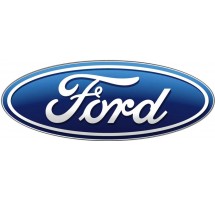 Top Class Action Lawsuits
Top Class Action Lawsuits
Got a Ford? How are your lug nuts? The automaker got hit with a defective automotive class action lawsuit this week, alleging it sold vehicles with defective lug nuts that swell and delaminate to such an extent that drivers cannot remove them with a lug wrench provided by Ford. This results in drivers being forced to pay a professional to replace the parts.
The Ford vehicles involved include the Ford Fusion, Escape, Flex, Focus, F-150 and F-350. According to the complaint, while the drivers might reasonably expect to be able to replace a flat tire using the wrench that is supplied by Ford with these vehicles, in practice, they cannot because the wrench no longer fits over the lug nuts if they swell or delaminate.
Here’s the skinny: according to the Ford lug nut complaint, filed by Ford drivers from seven states, the lug nuts that secure the wheels to Ford’s Fusion, Escape, Flex, Focus, F-150 and F-350 vehicles are made with a steel core and a chrome, aluminum or stainless steel cap that improves the product’s appearance but swells and delaminates. This purported defect renders the Ford-provided wrench useless, making drivers pay more than $30 per wheel, plus labor, to replace the parts and often stranding the drivers on the side of the road with a flat tire.
Consequently, drivers who have a flat tire can become stuck on the side of the road they are unable to fix themselves, putting them in a “precarious and dangerous place,” the lawsuit states. When drivers do make it to a repair facility, they typically have to pay for the labor of removing the defective lug nuts as well as new parts, the complaint states.
Further, the drivers claim that Ford doesn’t replace the faulty lug nuts, even if the parts fail within the new vehicle warranty period. This forces the affected vehicles owners to “spend hundreds of dollars for new lug nuts and the labor to install them,” the lawsuit states.
Ford customers have submitted “numerous complaints” to the National Highway Traffic Safety Administration, which Ford monitors, the complaint states. Therefore, the automaker is aware of the problem, according to the lawsuit.
The drivers seek to represent a nationwide class of consumers who purchased or leased an affected vehicle as well as classes of drivers in each of the 50 states. It is estimated that millions of vehicles have been affected.
The drivers are represented by Steve W. Berman and Thomas E. Loeser of Hagens Berman Sobol Shapiro LLP and E. Powell Miller and Sharon S. Almonrode of The Miller Law Firm PC.
The case is Josh Wozniak et al. vs. Ford Motor Company, case number 2:17-cv-12794 in the U.S. District Court for the Eastern District of Michigan.
Top Settlements
Victoza Settlement… Sitting down? Good, now strap yourselves in. A $60 million deal has been agreed between Novo Nordisk Inc., and federal agencies who alleged the pharmaceutical company engaged in misleading marketing practices concerning its best selling type 2 diabetes drug Victoza.
The US Department of Justice (DOJ) charged that the company misled physicians and insurers about the associated risk of cancer associated with Victoza, specifically that the drug has been linked to a rare cancer called medullary thyroid carcinoma.
According to the DOJ, the allegations go back to 2010, when the US Food and Drug Administration (FDA) initially approved the drug. The FDA had required Novo Nordisk to modify its FDA-mandated risk evaluation and mitigation strategies, or REMS, after a 2011 survey revealed that half of primary care doctors polled were unaware of the potential cancer risks associated with the drug, according to the DOJ. The drug has been linked to a rare cancer called medullary thyroid carcinoma, the DOJ said.
According to the terms of the deal, Novo Nordisk will pay over $43 million to the federal government and about $3.3 million to state Medicaid programs. The deal will resolve claims made the by agencies under the False Claims Act. Additionally, Novo Nordisk has agreed to turn over $12.15 million in profits to resolve claims made that it knowingly violated the federal Food, Drug and Cosmetic Act from 2010 to 2012.
The deal also resolved seven whistleblower lawsuits filed between 2010 and 2016. Eleven whistleblowers were involved in bringing the lawsuits, and at least one, made by Peter Dastous, a Novo Nordisk sales representative who was responsible for selling Victoza to endocrinologists in South Carolina and northern Georgia, alleged Medicaid fraud against private commercial health insurers, and the deal brings the aggregate settlement amount the company will pay to $60 million.
You couldn’t make this stuff up – even if you wanted to.
The federal lawsuit is United States et al. v. Novo Nordisk Inc., case number 1:17-cv-01820, in the U.S. District Court for the District of Columbia. The whistleblower suit filed by Dastous is United States et al. ex rel. Dastous v. Novo Nordisk Inc., case number 1:11-cv-01662, in the U.S. District Court for the District of Columbia.
More About Airbags… Here’s another whopper. Honda has agreed to pay $603 million to exit the defective Takata air bag multidistrict litigation. This will hasten the removal of the exploding airbags from about 16.5 million Honda vehicles.
According to Honda, a $200 million fund will be established to expand the Takata air bag inflator recall in an effort to reach owners of affected Honda vehicles who have not been located or have not responded to recall notices.
If approved, the preliminary Honda airbag settlement would make Honda the sixth automaker to be exit the litigation, following Toyota, Subaru, Mazda and BMW who agreed to pay a combined $553.6 million. Nissan has also settled for $98 million. If Honda’s deal is approved, Ford would be the only remaining automaker in the lawsuit.
According to the terms of the deal, class members will be provided with rental or loaner vehicles while they deal with fixing their cars. Remaining funds will be distributed to class members in amounts up to $250.
The lawsuit was originally filed in 2014, claiming that Takata air bags contained volatile ammonium nitrate that when inflated, can misfire, especially in humid conditions, blasting chemicals and shrapnel at passengers and drivers. Takata’s air bag inflators have been linked to at least 11 deaths in the US and the company has faced massive global recalls.
Prior to filing for bankruptcy in June of this year, Takata pled guilty to wire fraud, agreed to pay $1 billion in fines and restitution, and acknowledged that it ran a scheme to use false reports and other misrepresentations to convince automakers to buy air bag systems that contained faulty, inferior or otherwise defective inflators.
The case is In re: Takata Airbag Products Liability Litigation, case number 1:15-md-02599, in the US District Court for the Southern District of Florida.
Ok – That’s a wrap for this week. See you at the bar!

 Top Class Action Lawsuits
Top Class Action Lawsuits  Top Class Action Lawsuits
Top Class Action Lawsuits  Top Class Action Lawsuits
Top Class Action Lawsuits  Top Class Action Lawsuits
Top Class Action Lawsuits  Top Class Action Lawsuits
Top Class Action Lawsuits  Top Class Action Lawsuits
Top Class Action Lawsuits Top Class Action Lawsuits
Top Class Action Lawsuits